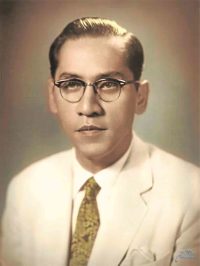This morning I woke up with a clear memory of what transpired last night, the first which, for quite a number of days, did not subject us to the darkness required by the “black out” regulations. With what haste did we remove from the window panes the black cardboards which had been affording the house a tinge of mourning! When we put the lights on that spoke to us of life, how deeply I felt nailed within me the wards of the Genesis: “Let there be light!” I understood only then the deep symbolism it entailed: the sons of the light chasing away the darkness of sin! Again in my ears once more rang the remarks of radio commentator Ignacio Javier: “Away with blackouts! Manila is already an open city. Open to life, not to destruction; to hope, not to despair. It is the limpid soul of the people who has no fear of the enemy. Let the latter know it! Here we are, reposing our trust upon decency and respect. What matters whether there has been or not any official announcement thereof? The facts are openb to all eyes. Manila is full of light. She hides nothing. Why, then, come to destroy her?”
The day was gone. Will Japan’s heralded threat also go out? I could not believe she was capable of so much indignity by attacking our capital, which, in truth had ceased to be a military objective. Already the last vestiges of the military had been removed. Only civilians remained, who wished to resume their peaceful living. Our helpless condition was our best defense. At least, thus I chose to believe.
A about three in the afternoon –perhaps, impelled by the new situation– I sought some amusement. Was it, perhaps a note of irresponsibility on my part? I did not bother to ascertain it. I went to see a movie. I hired a taxicab to take me to the Capitol Theater at the Escolta street. When we reached Plaza Lawton, I noticed that the people along the sidewalks of the avenue were looking at the skies. They, then, started running feverishly in no particular direction. Suddenly, I became afraid. But, before I could logically react, the taxicab came to a sudden stop. The driver opened the door and rushed out as he cried, “Air raid, sir!”
instinctively I, too, stepped out of the car. | caught sight of the driver as he speedily headed for the Post Office building, not very far away. For my part, I likewise ran fast, so much so, indeed, that I not only overtook the driver, I even reached the basement of the said building ahead of him. There was already a considerable crowd seeking protection. It was not a place duly set up as a shelter against air raids, but, at least, there were four storeys above us and the columns supporting them were impressively solid. I felt adequately protected.
I could clearly perceive the zoom of the planes. Every minute they came nearer and nearer. Absolute silence overtook us all, except for the murmuring prayers of those present. Next, and only then, we began to hear the wailing moan of the air raid alarm. Why only now? What had caused this delay? Was there, like on past occasions, some intent of sabotage?
Immediately, the bombing started. The shrieking explosions made me fear that the bombs were being dropped rather close to where we were. This seemed to be confirmed by the effect on the window panes of the upper storeys which broke into splinters, and the visible rattling of the whole building. At length, the attack ceased. Only a few minutes had elapsed, according to my watch; for me, however, it seemed like an eternity. We could clearly hear the planes as they flew away. Much later, the “All clear” signal was sounded.
In much haste I abandoned my refuge. Together with the other onlookers, I watched the ships docked at the Pasig river nearby, as they were being consumed by huge flames under a thick cloud of smoke. I could also see the buildings of the National Press Club and the Manila Chamber of Commerce, likewise burning furiously. These vessels of our merchant marine and these civilian buildings had, therefore, been the targets of the enemy planes.
Were they, perhaps, military objectives? I preferred not to engage in subtleties. What to me seemed obvious was that the Japanese had made good their announced threat. They would not respect Manila as an open city. But the fact was that it was an open city; it was for this reason that no force of ours had come forth to face the enemy nor had there been any single cannon to fire at them. What was, however, no longer too clear was whether our weakness and defenselessness were our best protection.
What was clear to me was that the original purpose of my trip this afternoon had since lost all appeal. Who cared for a movie now?
I chose, therefore, to go back home. I must do so by walking, for it was absolutely impossible to resort to any public means of transportation.
This night, while engrossed in my daily prayers, this question, goaded by some anguish, escaped from my internal self: “Until when O Lord?”
